Threat to Democracy Essay
VerifiedAdded on 2019/10/30
|10
|2545
|264
Essay
AI Summary
This essay examines the assertion that democratically elected leaders, rather than military coups, pose the greatest threat to democracy today. It begins by establishing the historical context of democracy's rise and its perceived vulnerability to military interventions. However, the essay argues that a new threat has emerged: the rise of elected autocrats who subvert democratic principles while maintaining the facade of elections. Case studies of countries like Rwanda, Ukraine, Kenya, Egypt, and the United States illustrate how democratically elected leaders can erode democratic institutions, suppress dissent, and concentrate power. The essay explores the influence of the Chinese model of governance, which emphasizes control and economic progress over democratic freedoms, as a contributing factor. It also discusses the limitations of democracy, such as the potential for majoritarianism and the lack of sufficient checks and balances on executive power. The essay concludes by suggesting that the survival of democracy requires a vigilant citizenry, strong constitutional frameworks, and self-restraint from elected leaders to avoid the pitfalls of unchecked power and the erosion of democratic norms.
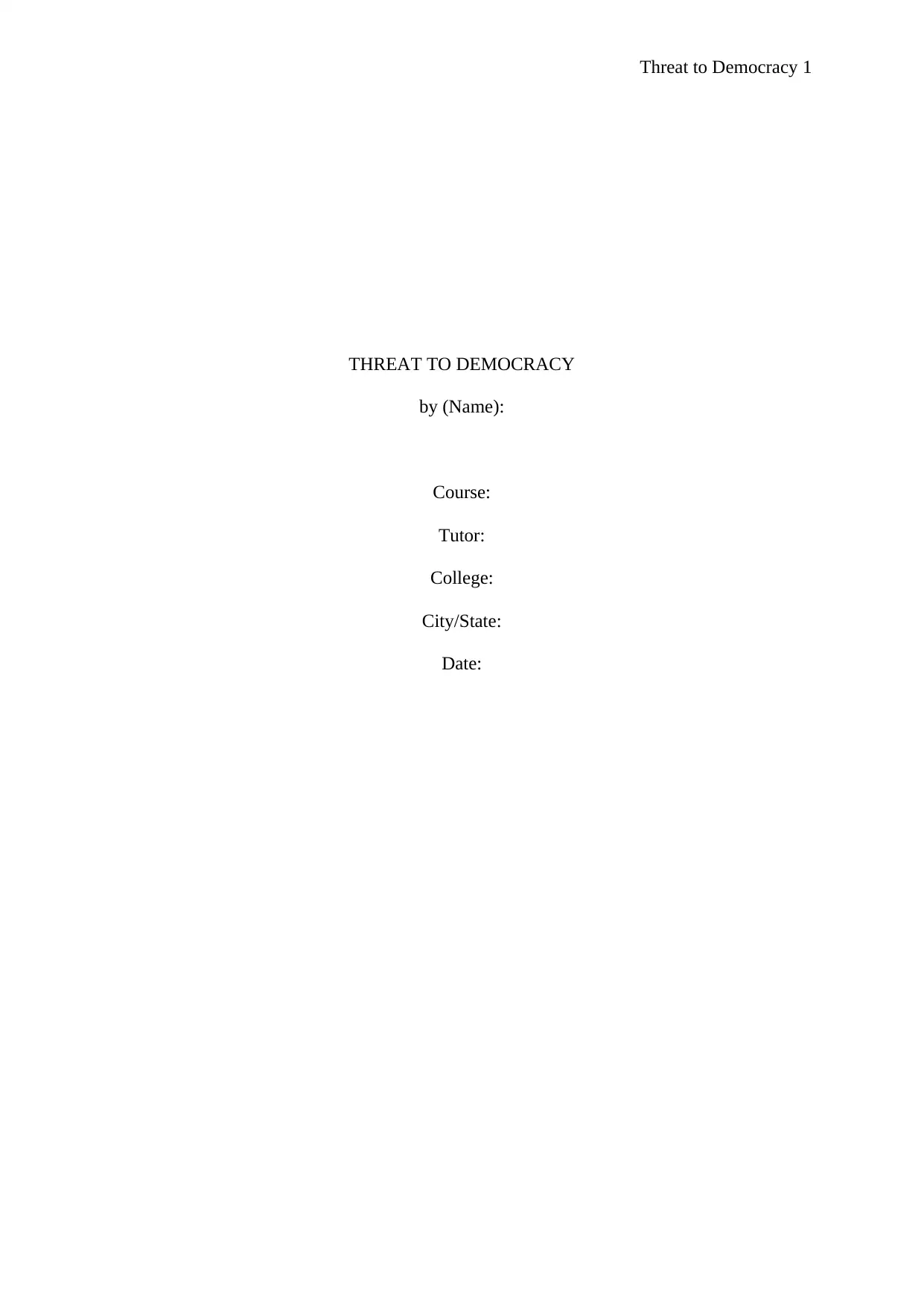
Threat to Democracy 1
THREAT TO DEMOCRACY
by (Name):
Course:
Tutor:
College:
City/State:
Date:
THREAT TO DEMOCRACY
by (Name):
Course:
Tutor:
College:
City/State:
Date:
Paraphrase This Document
Need a fresh take? Get an instant paraphrase of this document with our AI Paraphraser
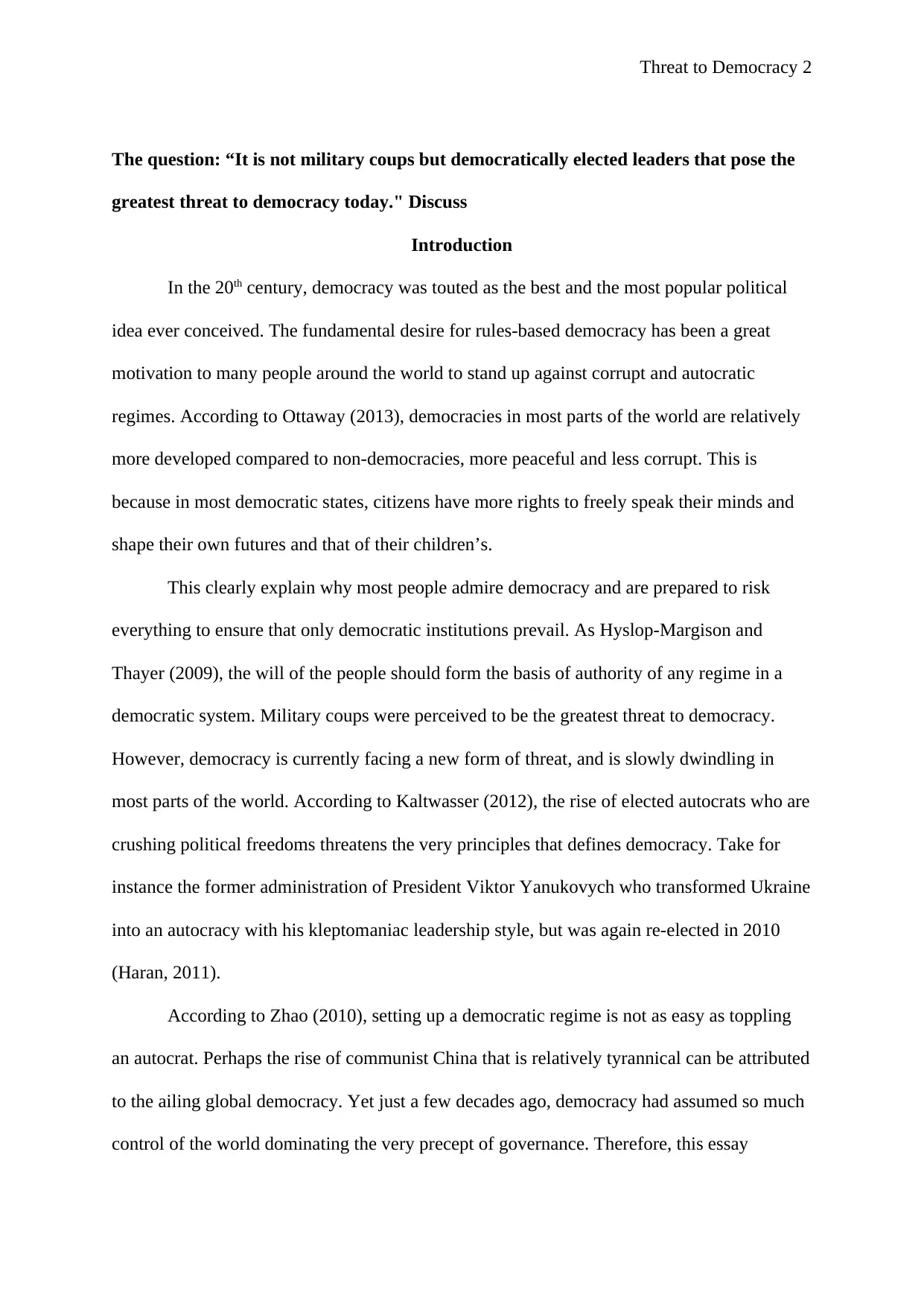
Threat to Democracy 2
The question: “It is not military coups but democratically elected leaders that pose the
greatest threat to democracy today." Discuss
Introduction
In the 20th century, democracy was touted as the best and the most popular political
idea ever conceived. The fundamental desire for rules-based democracy has been a great
motivation to many people around the world to stand up against corrupt and autocratic
regimes. According to Ottaway (2013), democracies in most parts of the world are relatively
more developed compared to non-democracies, more peaceful and less corrupt. This is
because in most democratic states, citizens have more rights to freely speak their minds and
shape their own futures and that of their children’s.
This clearly explain why most people admire democracy and are prepared to risk
everything to ensure that only democratic institutions prevail. As Hyslop-Margison and
Thayer (2009), the will of the people should form the basis of authority of any regime in a
democratic system. Military coups were perceived to be the greatest threat to democracy.
However, democracy is currently facing a new form of threat, and is slowly dwindling in
most parts of the world. According to Kaltwasser (2012), the rise of elected autocrats who are
crushing political freedoms threatens the very principles that defines democracy. Take for
instance the former administration of President Viktor Yanukovych who transformed Ukraine
into an autocracy with his kleptomaniac leadership style, but was again re-elected in 2010
(Haran, 2011).
According to Zhao (2010), setting up a democratic regime is not as easy as toppling
an autocrat. Perhaps the rise of communist China that is relatively tyrannical can be attributed
to the ailing global democracy. Yet just a few decades ago, democracy had assumed so much
control of the world dominating the very precept of governance. Therefore, this essay
The question: “It is not military coups but democratically elected leaders that pose the
greatest threat to democracy today." Discuss
Introduction
In the 20th century, democracy was touted as the best and the most popular political
idea ever conceived. The fundamental desire for rules-based democracy has been a great
motivation to many people around the world to stand up against corrupt and autocratic
regimes. According to Ottaway (2013), democracies in most parts of the world are relatively
more developed compared to non-democracies, more peaceful and less corrupt. This is
because in most democratic states, citizens have more rights to freely speak their minds and
shape their own futures and that of their children’s.
This clearly explain why most people admire democracy and are prepared to risk
everything to ensure that only democratic institutions prevail. As Hyslop-Margison and
Thayer (2009), the will of the people should form the basis of authority of any regime in a
democratic system. Military coups were perceived to be the greatest threat to democracy.
However, democracy is currently facing a new form of threat, and is slowly dwindling in
most parts of the world. According to Kaltwasser (2012), the rise of elected autocrats who are
crushing political freedoms threatens the very principles that defines democracy. Take for
instance the former administration of President Viktor Yanukovych who transformed Ukraine
into an autocracy with his kleptomaniac leadership style, but was again re-elected in 2010
(Haran, 2011).
According to Zhao (2010), setting up a democratic regime is not as easy as toppling
an autocrat. Perhaps the rise of communist China that is relatively tyrannical can be attributed
to the ailing global democracy. Yet just a few decades ago, democracy had assumed so much
control of the world dominating the very precept of governance. Therefore, this essay
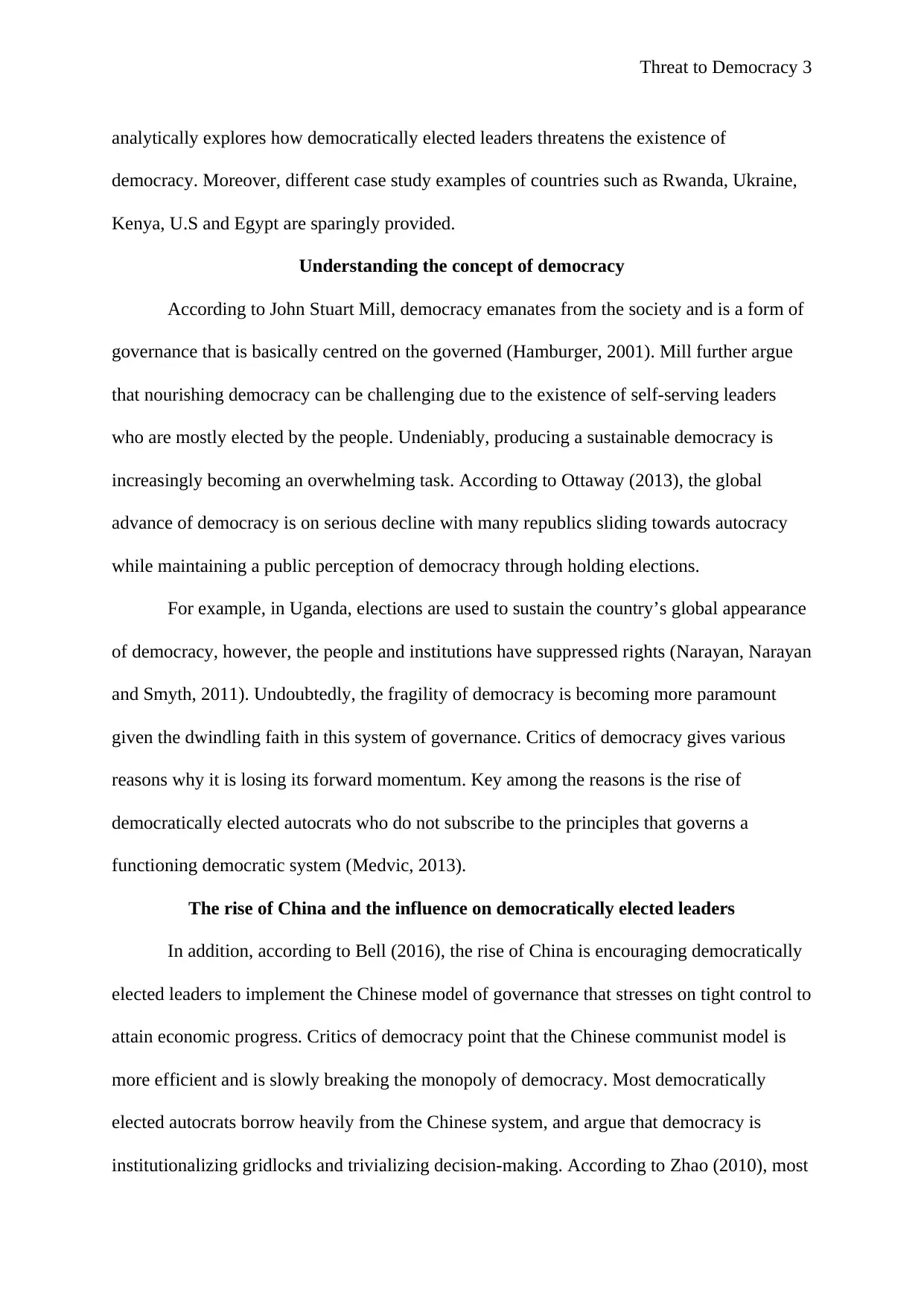
Threat to Democracy 3
analytically explores how democratically elected leaders threatens the existence of
democracy. Moreover, different case study examples of countries such as Rwanda, Ukraine,
Kenya, U.S and Egypt are sparingly provided.
Understanding the concept of democracy
According to John Stuart Mill, democracy emanates from the society and is a form of
governance that is basically centred on the governed (Hamburger, 2001). Mill further argue
that nourishing democracy can be challenging due to the existence of self-serving leaders
who are mostly elected by the people. Undeniably, producing a sustainable democracy is
increasingly becoming an overwhelming task. According to Ottaway (2013), the global
advance of democracy is on serious decline with many republics sliding towards autocracy
while maintaining a public perception of democracy through holding elections.
For example, in Uganda, elections are used to sustain the country’s global appearance
of democracy, however, the people and institutions have suppressed rights (Narayan, Narayan
and Smyth, 2011). Undoubtedly, the fragility of democracy is becoming more paramount
given the dwindling faith in this system of governance. Critics of democracy gives various
reasons why it is losing its forward momentum. Key among the reasons is the rise of
democratically elected autocrats who do not subscribe to the principles that governs a
functioning democratic system (Medvic, 2013).
The rise of China and the influence on democratically elected leaders
In addition, according to Bell (2016), the rise of China is encouraging democratically
elected leaders to implement the Chinese model of governance that stresses on tight control to
attain economic progress. Critics of democracy point that the Chinese communist model is
more efficient and is slowly breaking the monopoly of democracy. Most democratically
elected autocrats borrow heavily from the Chinese system, and argue that democracy is
institutionalizing gridlocks and trivializing decision-making. According to Zhao (2010), most
analytically explores how democratically elected leaders threatens the existence of
democracy. Moreover, different case study examples of countries such as Rwanda, Ukraine,
Kenya, U.S and Egypt are sparingly provided.
Understanding the concept of democracy
According to John Stuart Mill, democracy emanates from the society and is a form of
governance that is basically centred on the governed (Hamburger, 2001). Mill further argue
that nourishing democracy can be challenging due to the existence of self-serving leaders
who are mostly elected by the people. Undeniably, producing a sustainable democracy is
increasingly becoming an overwhelming task. According to Ottaway (2013), the global
advance of democracy is on serious decline with many republics sliding towards autocracy
while maintaining a public perception of democracy through holding elections.
For example, in Uganda, elections are used to sustain the country’s global appearance
of democracy, however, the people and institutions have suppressed rights (Narayan, Narayan
and Smyth, 2011). Undoubtedly, the fragility of democracy is becoming more paramount
given the dwindling faith in this system of governance. Critics of democracy gives various
reasons why it is losing its forward momentum. Key among the reasons is the rise of
democratically elected autocrats who do not subscribe to the principles that governs a
functioning democratic system (Medvic, 2013).
The rise of China and the influence on democratically elected leaders
In addition, according to Bell (2016), the rise of China is encouraging democratically
elected leaders to implement the Chinese model of governance that stresses on tight control to
attain economic progress. Critics of democracy point that the Chinese communist model is
more efficient and is slowly breaking the monopoly of democracy. Most democratically
elected autocrats borrow heavily from the Chinese system, and argue that democracy is
institutionalizing gridlocks and trivializing decision-making. According to Zhao (2010), most
⊘ This is a preview!⊘
Do you want full access?
Subscribe today to unlock all pages.

Trusted by 1+ million students worldwide
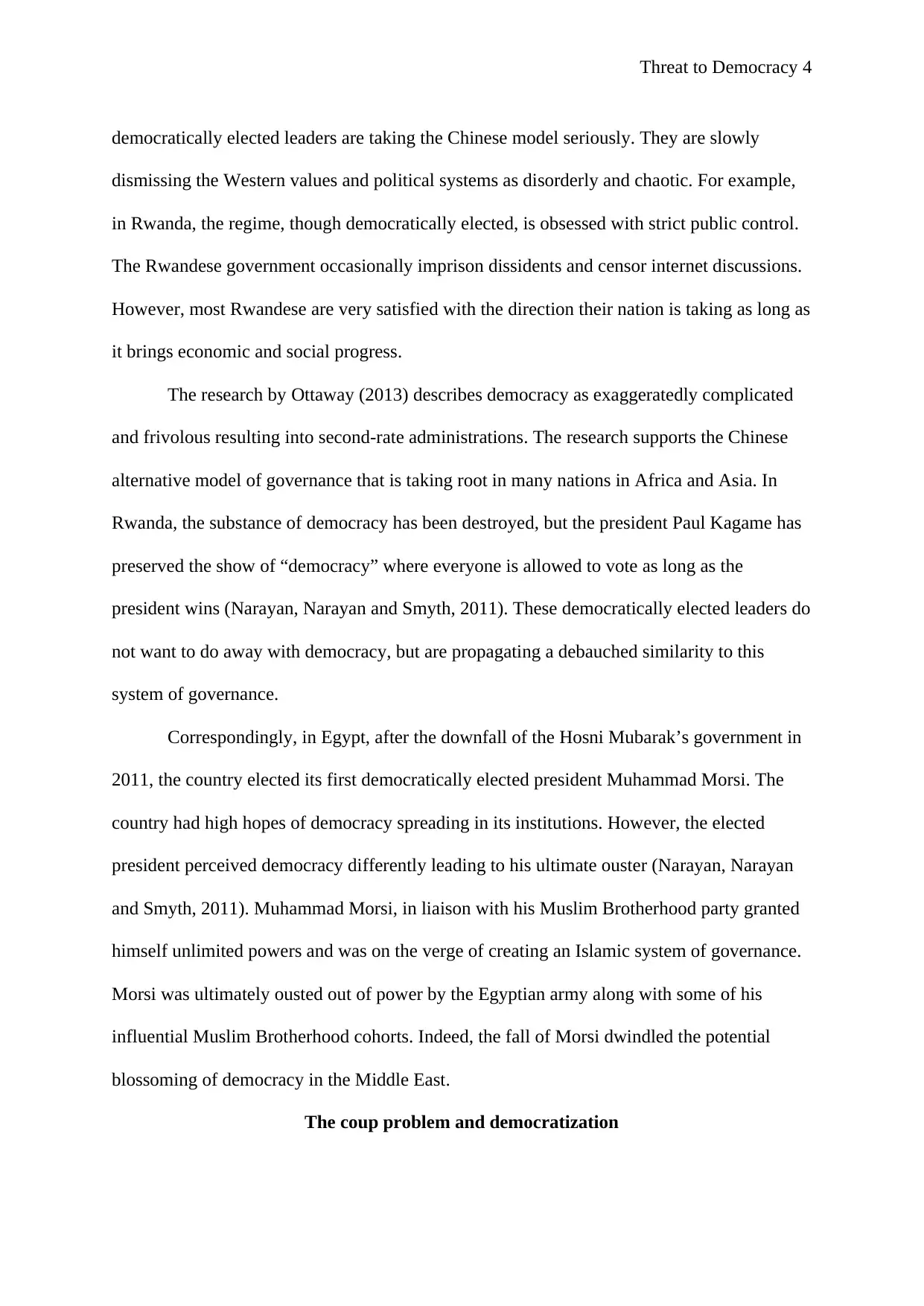
Threat to Democracy 4
democratically elected leaders are taking the Chinese model seriously. They are slowly
dismissing the Western values and political systems as disorderly and chaotic. For example,
in Rwanda, the regime, though democratically elected, is obsessed with strict public control.
The Rwandese government occasionally imprison dissidents and censor internet discussions.
However, most Rwandese are very satisfied with the direction their nation is taking as long as
it brings economic and social progress.
The research by Ottaway (2013) describes democracy as exaggeratedly complicated
and frivolous resulting into second-rate administrations. The research supports the Chinese
alternative model of governance that is taking root in many nations in Africa and Asia. In
Rwanda, the substance of democracy has been destroyed, but the president Paul Kagame has
preserved the show of “democracy” where everyone is allowed to vote as long as the
president wins (Narayan, Narayan and Smyth, 2011). These democratically elected leaders do
not want to do away with democracy, but are propagating a debauched similarity to this
system of governance.
Correspondingly, in Egypt, after the downfall of the Hosni Mubarak’s government in
2011, the country elected its first democratically elected president Muhammad Morsi. The
country had high hopes of democracy spreading in its institutions. However, the elected
president perceived democracy differently leading to his ultimate ouster (Narayan, Narayan
and Smyth, 2011). Muhammad Morsi, in liaison with his Muslim Brotherhood party granted
himself unlimited powers and was on the verge of creating an Islamic system of governance.
Morsi was ultimately ousted out of power by the Egyptian army along with some of his
influential Muslim Brotherhood cohorts. Indeed, the fall of Morsi dwindled the potential
blossoming of democracy in the Middle East.
The coup problem and democratization
democratically elected leaders are taking the Chinese model seriously. They are slowly
dismissing the Western values and political systems as disorderly and chaotic. For example,
in Rwanda, the regime, though democratically elected, is obsessed with strict public control.
The Rwandese government occasionally imprison dissidents and censor internet discussions.
However, most Rwandese are very satisfied with the direction their nation is taking as long as
it brings economic and social progress.
The research by Ottaway (2013) describes democracy as exaggeratedly complicated
and frivolous resulting into second-rate administrations. The research supports the Chinese
alternative model of governance that is taking root in many nations in Africa and Asia. In
Rwanda, the substance of democracy has been destroyed, but the president Paul Kagame has
preserved the show of “democracy” where everyone is allowed to vote as long as the
president wins (Narayan, Narayan and Smyth, 2011). These democratically elected leaders do
not want to do away with democracy, but are propagating a debauched similarity to this
system of governance.
Correspondingly, in Egypt, after the downfall of the Hosni Mubarak’s government in
2011, the country elected its first democratically elected president Muhammad Morsi. The
country had high hopes of democracy spreading in its institutions. However, the elected
president perceived democracy differently leading to his ultimate ouster (Narayan, Narayan
and Smyth, 2011). Muhammad Morsi, in liaison with his Muslim Brotherhood party granted
himself unlimited powers and was on the verge of creating an Islamic system of governance.
Morsi was ultimately ousted out of power by the Egyptian army along with some of his
influential Muslim Brotherhood cohorts. Indeed, the fall of Morsi dwindled the potential
blossoming of democracy in the Middle East.
The coup problem and democratization
Paraphrase This Document
Need a fresh take? Get an instant paraphrase of this document with our AI Paraphraser
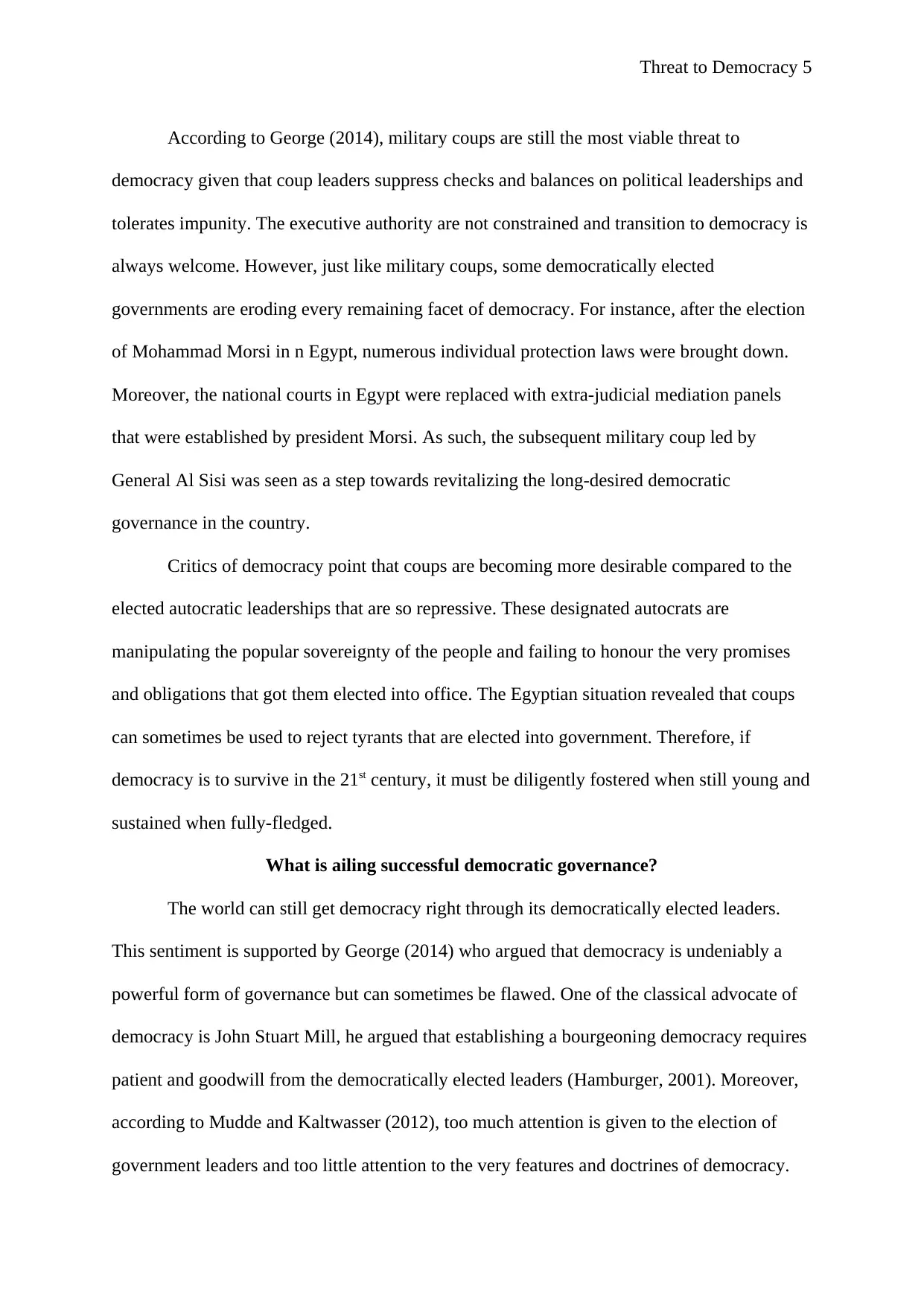
Threat to Democracy 5
According to George (2014), military coups are still the most viable threat to
democracy given that coup leaders suppress checks and balances on political leaderships and
tolerates impunity. The executive authority are not constrained and transition to democracy is
always welcome. However, just like military coups, some democratically elected
governments are eroding every remaining facet of democracy. For instance, after the election
of Mohammad Morsi in n Egypt, numerous individual protection laws were brought down.
Moreover, the national courts in Egypt were replaced with extra-judicial mediation panels
that were established by president Morsi. As such, the subsequent military coup led by
General Al Sisi was seen as a step towards revitalizing the long-desired democratic
governance in the country.
Critics of democracy point that coups are becoming more desirable compared to the
elected autocratic leaderships that are so repressive. These designated autocrats are
manipulating the popular sovereignty of the people and failing to honour the very promises
and obligations that got them elected into office. The Egyptian situation revealed that coups
can sometimes be used to reject tyrants that are elected into government. Therefore, if
democracy is to survive in the 21st century, it must be diligently fostered when still young and
sustained when fully-fledged.
What is ailing successful democratic governance?
The world can still get democracy right through its democratically elected leaders.
This sentiment is supported by George (2014) who argued that democracy is undeniably a
powerful form of governance but can sometimes be flawed. One of the classical advocate of
democracy is John Stuart Mill, he argued that establishing a bourgeoning democracy requires
patient and goodwill from the democratically elected leaders (Hamburger, 2001). Moreover,
according to Mudde and Kaltwasser (2012), too much attention is given to the election of
government leaders and too little attention to the very features and doctrines of democracy.
According to George (2014), military coups are still the most viable threat to
democracy given that coup leaders suppress checks and balances on political leaderships and
tolerates impunity. The executive authority are not constrained and transition to democracy is
always welcome. However, just like military coups, some democratically elected
governments are eroding every remaining facet of democracy. For instance, after the election
of Mohammad Morsi in n Egypt, numerous individual protection laws were brought down.
Moreover, the national courts in Egypt were replaced with extra-judicial mediation panels
that were established by president Morsi. As such, the subsequent military coup led by
General Al Sisi was seen as a step towards revitalizing the long-desired democratic
governance in the country.
Critics of democracy point that coups are becoming more desirable compared to the
elected autocratic leaderships that are so repressive. These designated autocrats are
manipulating the popular sovereignty of the people and failing to honour the very promises
and obligations that got them elected into office. The Egyptian situation revealed that coups
can sometimes be used to reject tyrants that are elected into government. Therefore, if
democracy is to survive in the 21st century, it must be diligently fostered when still young and
sustained when fully-fledged.
What is ailing successful democratic governance?
The world can still get democracy right through its democratically elected leaders.
This sentiment is supported by George (2014) who argued that democracy is undeniably a
powerful form of governance but can sometimes be flawed. One of the classical advocate of
democracy is John Stuart Mill, he argued that establishing a bourgeoning democracy requires
patient and goodwill from the democratically elected leaders (Hamburger, 2001). Moreover,
according to Mudde and Kaltwasser (2012), too much attention is given to the election of
government leaders and too little attention to the very features and doctrines of democracy.
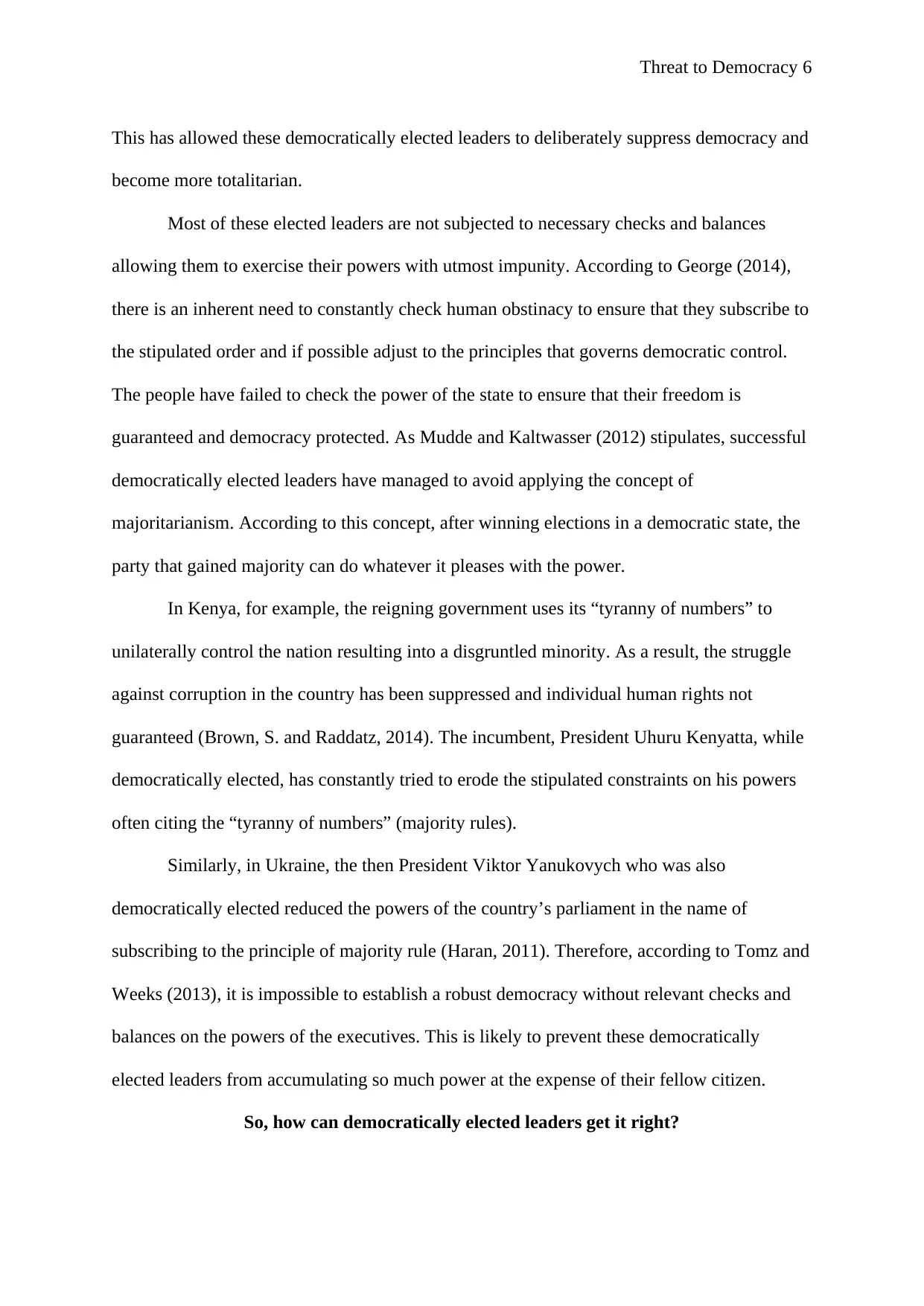
Threat to Democracy 6
This has allowed these democratically elected leaders to deliberately suppress democracy and
become more totalitarian.
Most of these elected leaders are not subjected to necessary checks and balances
allowing them to exercise their powers with utmost impunity. According to George (2014),
there is an inherent need to constantly check human obstinacy to ensure that they subscribe to
the stipulated order and if possible adjust to the principles that governs democratic control.
The people have failed to check the power of the state to ensure that their freedom is
guaranteed and democracy protected. As Mudde and Kaltwasser (2012) stipulates, successful
democratically elected leaders have managed to avoid applying the concept of
majoritarianism. According to this concept, after winning elections in a democratic state, the
party that gained majority can do whatever it pleases with the power.
In Kenya, for example, the reigning government uses its “tyranny of numbers” to
unilaterally control the nation resulting into a disgruntled minority. As a result, the struggle
against corruption in the country has been suppressed and individual human rights not
guaranteed (Brown, S. and Raddatz, 2014). The incumbent, President Uhuru Kenyatta, while
democratically elected, has constantly tried to erode the stipulated constraints on his powers
often citing the “tyranny of numbers” (majority rules).
Similarly, in Ukraine, the then President Viktor Yanukovych who was also
democratically elected reduced the powers of the country’s parliament in the name of
subscribing to the principle of majority rule (Haran, 2011). Therefore, according to Tomz and
Weeks (2013), it is impossible to establish a robust democracy without relevant checks and
balances on the powers of the executives. This is likely to prevent these democratically
elected leaders from accumulating so much power at the expense of their fellow citizen.
So, how can democratically elected leaders get it right?
This has allowed these democratically elected leaders to deliberately suppress democracy and
become more totalitarian.
Most of these elected leaders are not subjected to necessary checks and balances
allowing them to exercise their powers with utmost impunity. According to George (2014),
there is an inherent need to constantly check human obstinacy to ensure that they subscribe to
the stipulated order and if possible adjust to the principles that governs democratic control.
The people have failed to check the power of the state to ensure that their freedom is
guaranteed and democracy protected. As Mudde and Kaltwasser (2012) stipulates, successful
democratically elected leaders have managed to avoid applying the concept of
majoritarianism. According to this concept, after winning elections in a democratic state, the
party that gained majority can do whatever it pleases with the power.
In Kenya, for example, the reigning government uses its “tyranny of numbers” to
unilaterally control the nation resulting into a disgruntled minority. As a result, the struggle
against corruption in the country has been suppressed and individual human rights not
guaranteed (Brown, S. and Raddatz, 2014). The incumbent, President Uhuru Kenyatta, while
democratically elected, has constantly tried to erode the stipulated constraints on his powers
often citing the “tyranny of numbers” (majority rules).
Similarly, in Ukraine, the then President Viktor Yanukovych who was also
democratically elected reduced the powers of the country’s parliament in the name of
subscribing to the principle of majority rule (Haran, 2011). Therefore, according to Tomz and
Weeks (2013), it is impossible to establish a robust democracy without relevant checks and
balances on the powers of the executives. This is likely to prevent these democratically
elected leaders from accumulating so much power at the expense of their fellow citizen.
So, how can democratically elected leaders get it right?
⊘ This is a preview!⊘
Do you want full access?
Subscribe today to unlock all pages.

Trusted by 1+ million students worldwide
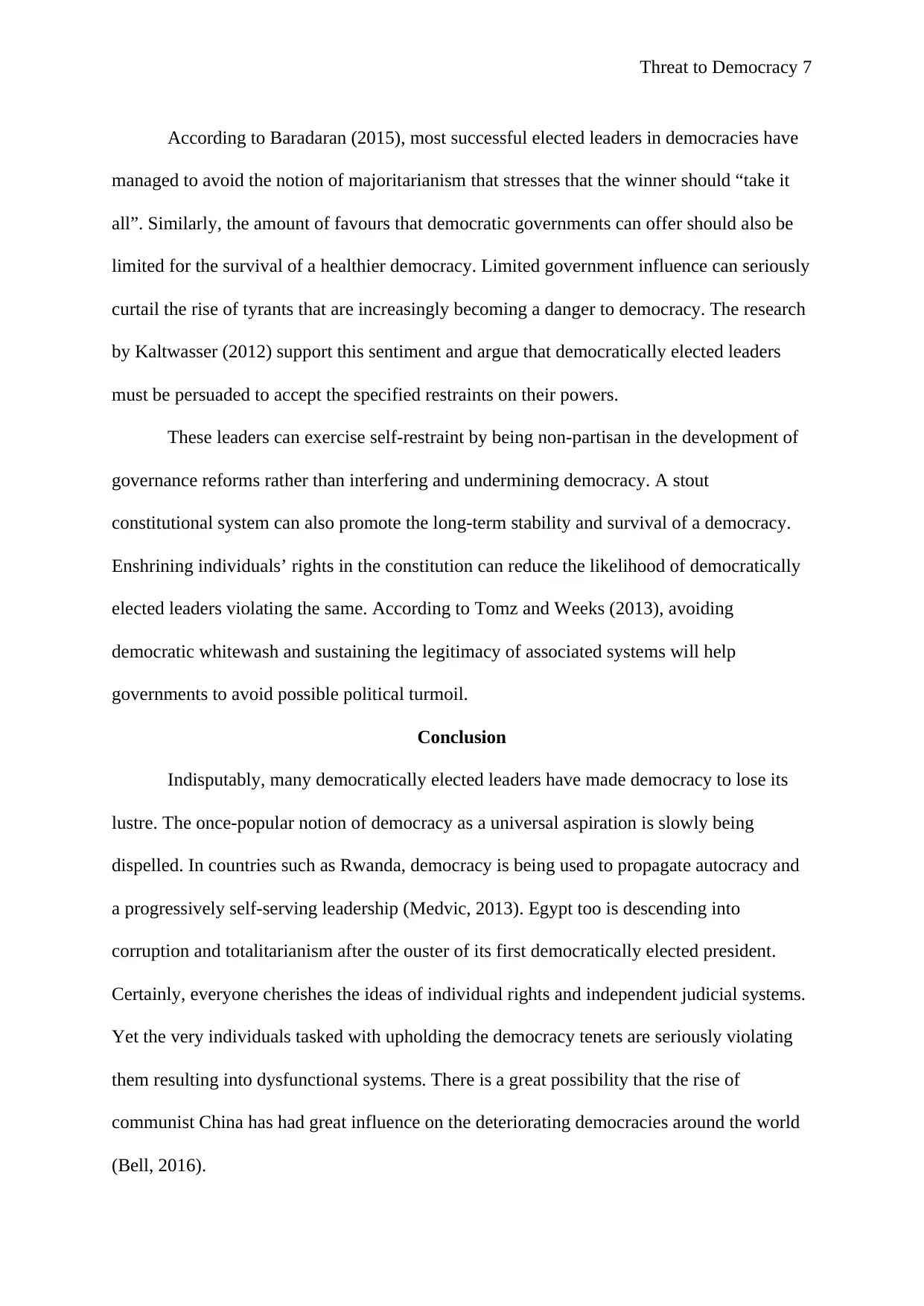
Threat to Democracy 7
According to Baradaran (2015), most successful elected leaders in democracies have
managed to avoid the notion of majoritarianism that stresses that the winner should “take it
all”. Similarly, the amount of favours that democratic governments can offer should also be
limited for the survival of a healthier democracy. Limited government influence can seriously
curtail the rise of tyrants that are increasingly becoming a danger to democracy. The research
by Kaltwasser (2012) support this sentiment and argue that democratically elected leaders
must be persuaded to accept the specified restraints on their powers.
These leaders can exercise self-restraint by being non-partisan in the development of
governance reforms rather than interfering and undermining democracy. A stout
constitutional system can also promote the long-term stability and survival of a democracy.
Enshrining individuals’ rights in the constitution can reduce the likelihood of democratically
elected leaders violating the same. According to Tomz and Weeks (2013), avoiding
democratic whitewash and sustaining the legitimacy of associated systems will help
governments to avoid possible political turmoil.
Conclusion
Indisputably, many democratically elected leaders have made democracy to lose its
lustre. The once-popular notion of democracy as a universal aspiration is slowly being
dispelled. In countries such as Rwanda, democracy is being used to propagate autocracy and
a progressively self-serving leadership (Medvic, 2013). Egypt too is descending into
corruption and totalitarianism after the ouster of its first democratically elected president.
Certainly, everyone cherishes the ideas of individual rights and independent judicial systems.
Yet the very individuals tasked with upholding the democracy tenets are seriously violating
them resulting into dysfunctional systems. There is a great possibility that the rise of
communist China has had great influence on the deteriorating democracies around the world
(Bell, 2016).
According to Baradaran (2015), most successful elected leaders in democracies have
managed to avoid the notion of majoritarianism that stresses that the winner should “take it
all”. Similarly, the amount of favours that democratic governments can offer should also be
limited for the survival of a healthier democracy. Limited government influence can seriously
curtail the rise of tyrants that are increasingly becoming a danger to democracy. The research
by Kaltwasser (2012) support this sentiment and argue that democratically elected leaders
must be persuaded to accept the specified restraints on their powers.
These leaders can exercise self-restraint by being non-partisan in the development of
governance reforms rather than interfering and undermining democracy. A stout
constitutional system can also promote the long-term stability and survival of a democracy.
Enshrining individuals’ rights in the constitution can reduce the likelihood of democratically
elected leaders violating the same. According to Tomz and Weeks (2013), avoiding
democratic whitewash and sustaining the legitimacy of associated systems will help
governments to avoid possible political turmoil.
Conclusion
Indisputably, many democratically elected leaders have made democracy to lose its
lustre. The once-popular notion of democracy as a universal aspiration is slowly being
dispelled. In countries such as Rwanda, democracy is being used to propagate autocracy and
a progressively self-serving leadership (Medvic, 2013). Egypt too is descending into
corruption and totalitarianism after the ouster of its first democratically elected president.
Certainly, everyone cherishes the ideas of individual rights and independent judicial systems.
Yet the very individuals tasked with upholding the democracy tenets are seriously violating
them resulting into dysfunctional systems. There is a great possibility that the rise of
communist China has had great influence on the deteriorating democracies around the world
(Bell, 2016).
Paraphrase This Document
Need a fresh take? Get an instant paraphrase of this document with our AI Paraphraser
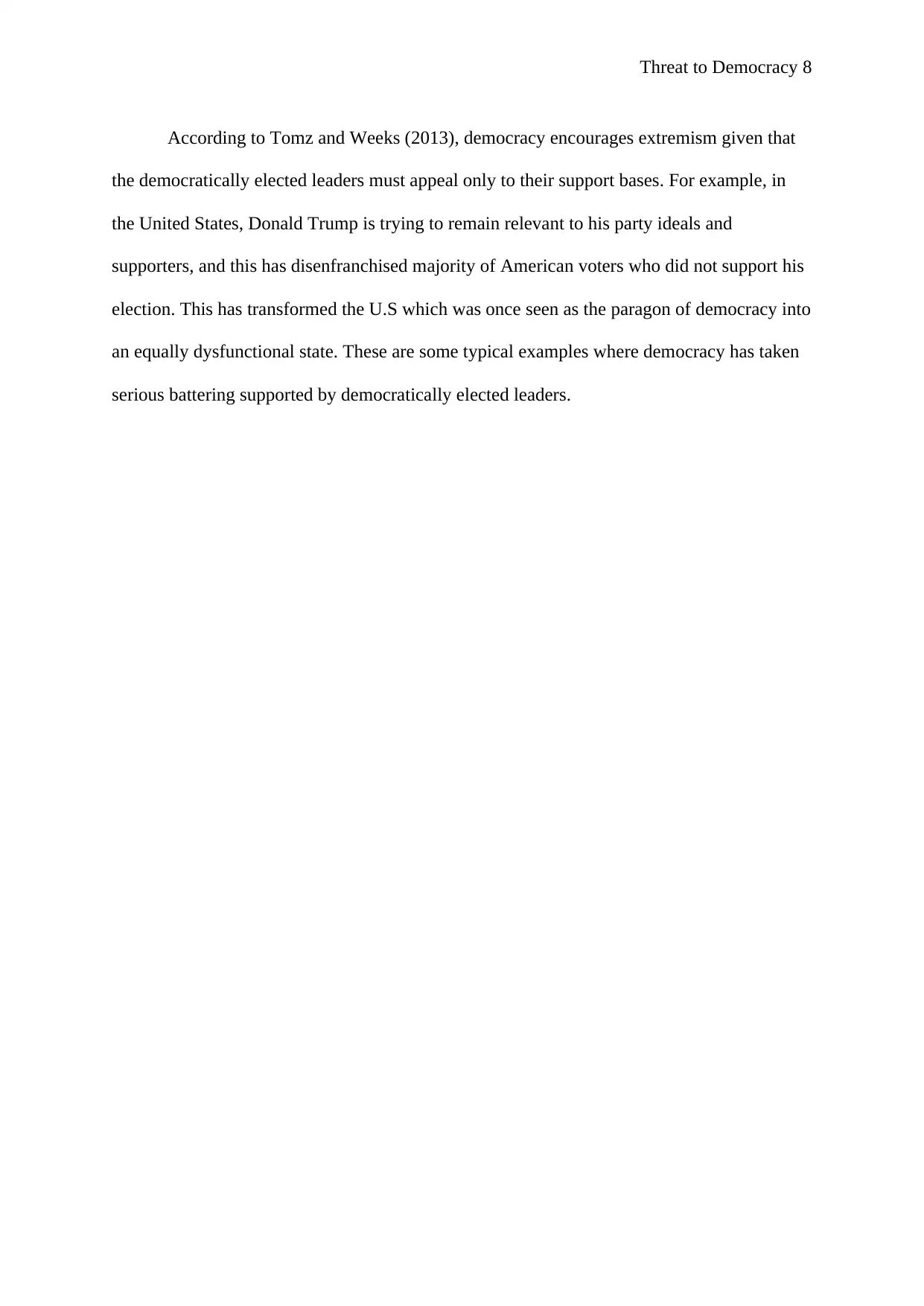
Threat to Democracy 8
According to Tomz and Weeks (2013), democracy encourages extremism given that
the democratically elected leaders must appeal only to their support bases. For example, in
the United States, Donald Trump is trying to remain relevant to his party ideals and
supporters, and this has disenfranchised majority of American voters who did not support his
election. This has transformed the U.S which was once seen as the paragon of democracy into
an equally dysfunctional state. These are some typical examples where democracy has taken
serious battering supported by democratically elected leaders.
According to Tomz and Weeks (2013), democracy encourages extremism given that
the democratically elected leaders must appeal only to their support bases. For example, in
the United States, Donald Trump is trying to remain relevant to his party ideals and
supporters, and this has disenfranchised majority of American voters who did not support his
election. This has transformed the U.S which was once seen as the paragon of democracy into
an equally dysfunctional state. These are some typical examples where democracy has taken
serious battering supported by democratically elected leaders.
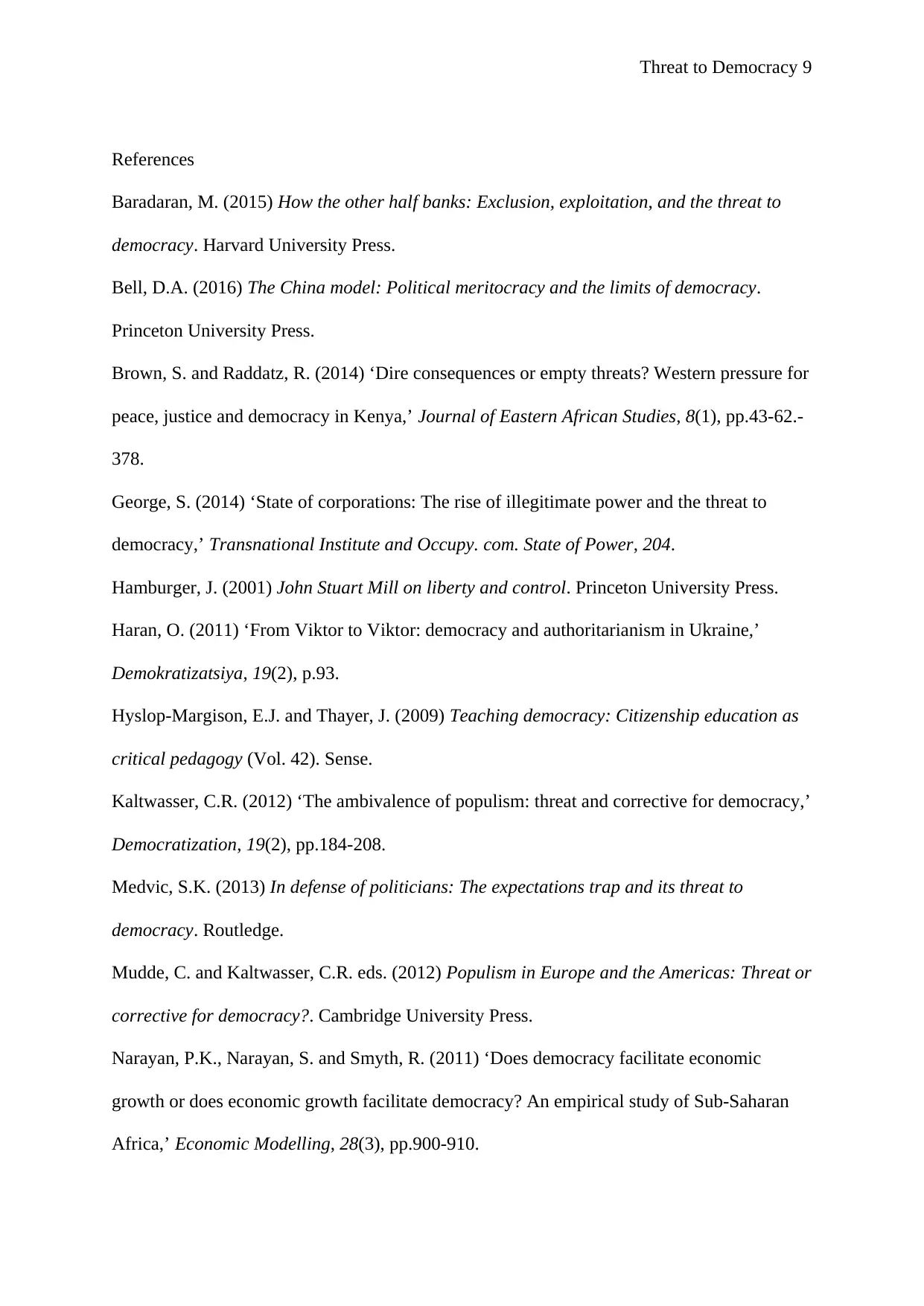
Threat to Democracy 9
References
Baradaran, M. (2015) How the other half banks: Exclusion, exploitation, and the threat to
democracy. Harvard University Press.
Bell, D.A. (2016) The China model: Political meritocracy and the limits of democracy.
Princeton University Press.
Brown, S. and Raddatz, R. (2014) ‘Dire consequences or empty threats? Western pressure for
peace, justice and democracy in Kenya,’ Journal of Eastern African Studies, 8(1), pp.43-62.-
378.
George, S. (2014) ‘State of corporations: The rise of illegitimate power and the threat to
democracy,’ Transnational Institute and Occupy. com. State of Power, 204.
Hamburger, J. (2001) John Stuart Mill on liberty and control. Princeton University Press.
Haran, O. (2011) ‘From Viktor to Viktor: democracy and authoritarianism in Ukraine,’
Demokratizatsiya, 19(2), p.93.
Hyslop-Margison, E.J. and Thayer, J. (2009) Teaching democracy: Citizenship education as
critical pedagogy (Vol. 42). Sense.
Kaltwasser, C.R. (2012) ‘The ambivalence of populism: threat and corrective for democracy,’
Democratization, 19(2), pp.184-208.
Medvic, S.K. (2013) In defense of politicians: The expectations trap and its threat to
democracy. Routledge.
Mudde, C. and Kaltwasser, C.R. eds. (2012) Populism in Europe and the Americas: Threat or
corrective for democracy?. Cambridge University Press.
Narayan, P.K., Narayan, S. and Smyth, R. (2011) ‘Does democracy facilitate economic
growth or does economic growth facilitate democracy? An empirical study of Sub-Saharan
Africa,’ Economic Modelling, 28(3), pp.900-910.
References
Baradaran, M. (2015) How the other half banks: Exclusion, exploitation, and the threat to
democracy. Harvard University Press.
Bell, D.A. (2016) The China model: Political meritocracy and the limits of democracy.
Princeton University Press.
Brown, S. and Raddatz, R. (2014) ‘Dire consequences or empty threats? Western pressure for
peace, justice and democracy in Kenya,’ Journal of Eastern African Studies, 8(1), pp.43-62.-
378.
George, S. (2014) ‘State of corporations: The rise of illegitimate power and the threat to
democracy,’ Transnational Institute and Occupy. com. State of Power, 204.
Hamburger, J. (2001) John Stuart Mill on liberty and control. Princeton University Press.
Haran, O. (2011) ‘From Viktor to Viktor: democracy and authoritarianism in Ukraine,’
Demokratizatsiya, 19(2), p.93.
Hyslop-Margison, E.J. and Thayer, J. (2009) Teaching democracy: Citizenship education as
critical pedagogy (Vol. 42). Sense.
Kaltwasser, C.R. (2012) ‘The ambivalence of populism: threat and corrective for democracy,’
Democratization, 19(2), pp.184-208.
Medvic, S.K. (2013) In defense of politicians: The expectations trap and its threat to
democracy. Routledge.
Mudde, C. and Kaltwasser, C.R. eds. (2012) Populism in Europe and the Americas: Threat or
corrective for democracy?. Cambridge University Press.
Narayan, P.K., Narayan, S. and Smyth, R. (2011) ‘Does democracy facilitate economic
growth or does economic growth facilitate democracy? An empirical study of Sub-Saharan
Africa,’ Economic Modelling, 28(3), pp.900-910.
⊘ This is a preview!⊘
Do you want full access?
Subscribe today to unlock all pages.

Trusted by 1+ million students worldwide
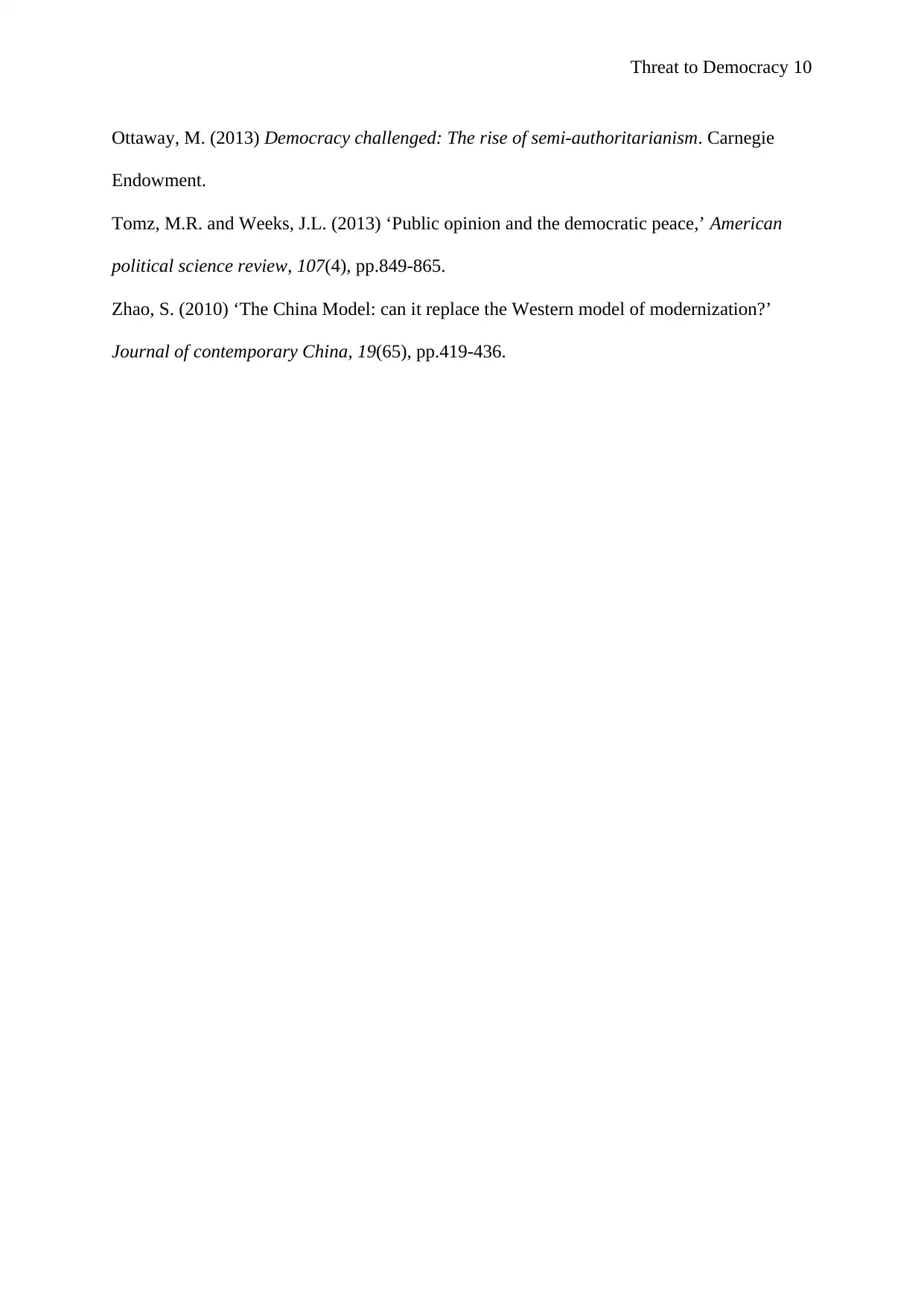
Threat to Democracy 10
Ottaway, M. (2013) Democracy challenged: The rise of semi-authoritarianism. Carnegie
Endowment.
Tomz, M.R. and Weeks, J.L. (2013) ‘Public opinion and the democratic peace,’ American
political science review, 107(4), pp.849-865.
Zhao, S. (2010) ‘The China Model: can it replace the Western model of modernization?’
Journal of contemporary China, 19(65), pp.419-436.
Ottaway, M. (2013) Democracy challenged: The rise of semi-authoritarianism. Carnegie
Endowment.
Tomz, M.R. and Weeks, J.L. (2013) ‘Public opinion and the democratic peace,’ American
political science review, 107(4), pp.849-865.
Zhao, S. (2010) ‘The China Model: can it replace the Western model of modernization?’
Journal of contemporary China, 19(65), pp.419-436.
1 out of 10
Your All-in-One AI-Powered Toolkit for Academic Success.
+13062052269
info@desklib.com
Available 24*7 on WhatsApp / Email
![[object Object]](/_next/static/media/star-bottom.7253800d.svg)
Unlock your academic potential
Copyright © 2020–2026 A2Z Services. All Rights Reserved. Developed and managed by ZUCOL.